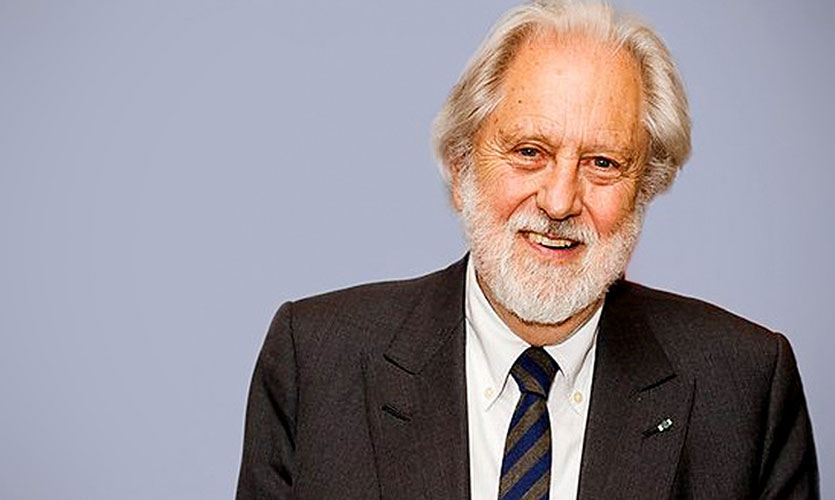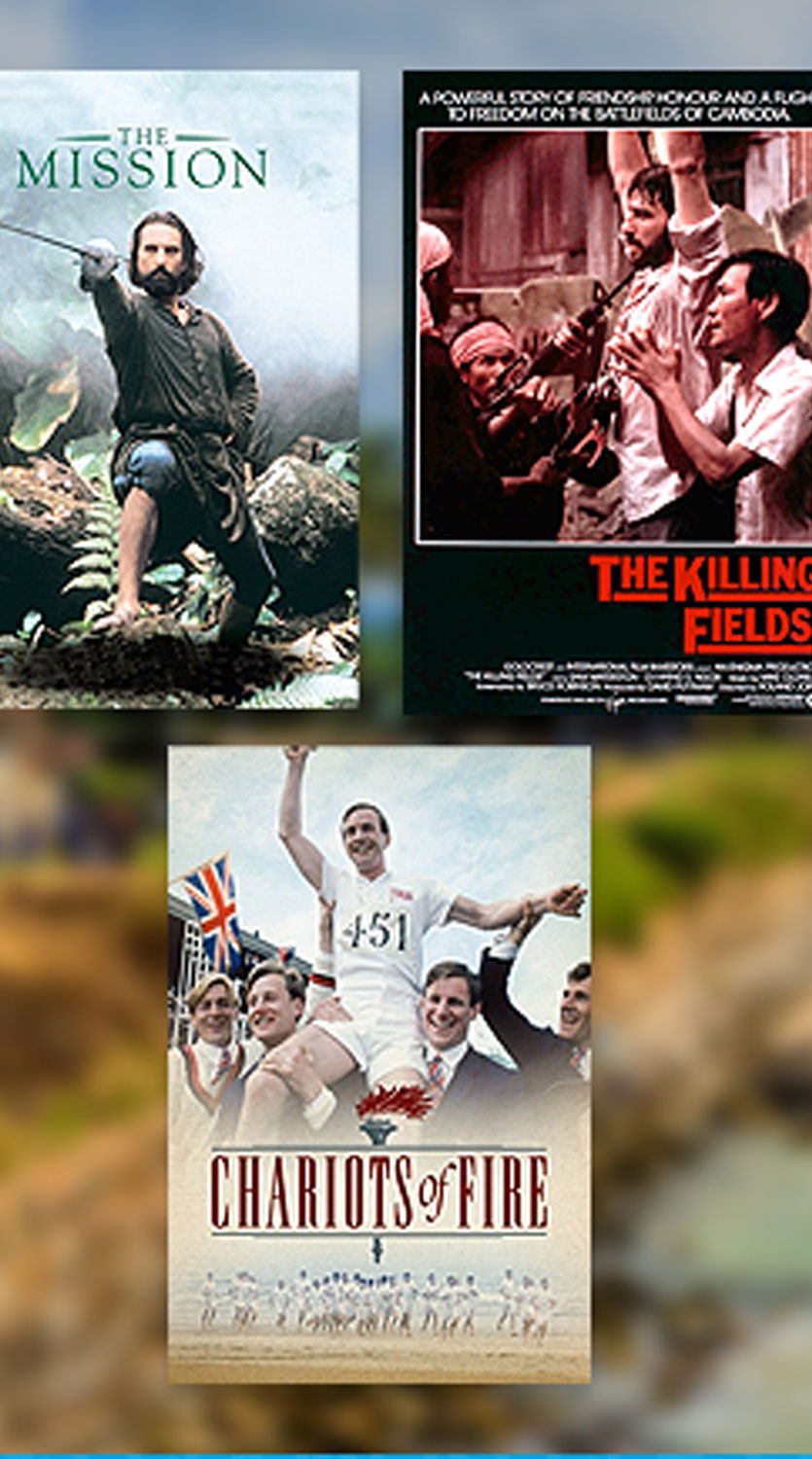“Chariots of Fire” producer Lord David Puttnam is no stranger to us film buffs! Film Producer and Educator, Lord David Puttnam has won 10 Oscars and 25 Baftas among many other awards. He received his knighthood in 1995 and retired from film production in 1998 to focus on his work in public policy.
His other famous works include “The Killing Fields” “Midnight Express” “Memphis Belle” and “The Mission”.
1. Can you tell us what got you into the film industry?
My first inspiration was my father; a press photographer and picture editor with Associated Press, so I grew up with a strong sense of visual narrative. From the moment I saw my first film, Bambi, I wanted to work in film. I thought ‘that’ is what I’d like to do, although I was not sure what ‘that’ was!
My father used to say ‘I don’t mind what you do as long as you try to be good at it.' I was hopeless at school and I left feeling dispirited and let down by the education system. However, I developed a strong work ethic and set my own targets.
When I went to ‘night school’ I created a whole curriculum for myself, studying economics, copyright law, design, and typography. I started out in advertising, eventually working with an excellent agency called Collett Dickenson Pearce. By age 24, I had become a Group Head working with Alan Parker and Charles Saatchi as writers, and Ridley Scott as an Art Director.
My time in advertising was invaluable as I learned about audiences; what motivates and moves them. But I still loved the movies, so I moved into film production, working with Sanford Lieberson's production company Goodtimes Enterprises. It was here we produced films like 'That'll Be the Day’ (1973), ‘Stardust’ (1974), Ken Russell's 'Mahler' (1974) and 'Lisztomania' (1975), and Alan Parker's 'Bugsy Malone' (1976).
2. When there are a lot of options in the film industry, from being an actor to a screenwriter, what is it about producing that got you hooked?
Working in advertising put me in touch with a lot of interesting people, including the director Richard Lester who encouraged me to give the film business a go. In the late 1960s, in a heavily unionised industry, working as a producer was the one thing you could do without a union ticket. In fact, I have greatly enjoyed life as a producer - my most valuable skill was being good at handling the egos of creative people, and I found that producing offered me a satisfactory level of creative involvement. I always enjoyed the concept of tailoring a film to a specific market. When I came across the original story of The Killing Fields, or the concept of what became Chariots of Fire, they were not just compelling stories, but as films that could find a particular place in the market, and appeal to certain audiences.
3. Tell us about Chariots of Fire. What was it like to produce and how did it feel to win an Academy Award for it?
In hindsight, I think it digs deeper into the psyche of its audience than anything else I’ve ever produced.
I saw audiences in China, without subtitles, moved to tears by the film – the imagery and ideal of ‘Chariots’ seems to create something spiritual that connects with viewers around the world.
I was inspired initially by my father’s pictures of the 1948 Olympics and then during research, I stumbled on Eric Liddell’s extraordinary story.
Even in those days when funding was more readily available, it wasn't an easy sell. The movie opened in 1981 to mixed reviews but as the film continued to be shown, audiences grew, and in America, those audiences got younger and younger. Slowly but surely, we found we had a global hit on our hands. Until that point, I was probably unknown to anyone except my immediate family!
Chariots of Fire is one of my proudest achievements – but that air-punching moment when you win is fleeting and not at all worthwhile. What’s worthwhile is making a really good film, a film you feel makes a real and lasting impact on its audience; that air-punching moment certainly isn't very sustaining.
4. In 1998 you retired from the film industry. Any particular reason?
As it turns out, I haven’t retired from the film industry. I took a twenty-year break to focus on public policy on education and environmental issues but have now been drawn back into the fray. I’ve always been passionately involved with climate change - I had the privilege of steering the world’s first Climate Change Act through Parliament in 2008 - and I’ve become increasingly convinced that the best way to influence thinking is through drama. I’m overseeing the adaptation of Greenpeace press officer Ben Stewart’s account of the Arctic 30 incident – hence the film’s title ‘Arctic 30’ - entitled Don’t Trust, Don’t Fear, Don’t Beg. The film will recount the story of the group of Greenpeace Activists who, in September 2013, scaled a Russian oil platform in an attempt to ‘Save the Arctic'. I was initially asked for advice about the film, and then found myself getting more and more involved. We’re currently in the latter process of script development and there’ll be more news in due course.
5. After a 30 year career in film; what is the most important lesson you have learned from it?
In the end, making movies is about creating magic. It's not a job - it's somewhere between an obsession, a vocation, and a calling. You’re obsessed if your work is going badly, and obsessed if it’s going well. But if you can manage to cope with all the rejection and truly create something as close as possible to magic, it’s the greatest career you could ever possibly have!
6. You are now very much involved in education and politics. Was this something you've always wanted to get involved with or was it a gradual realisation?
I had always been very interested in politics and in 1986 I found my way back to the Labour Party. I worked very closely with Gordon Brown when he was at the Dept of Trade and Industry, and very intensively on the 1992 and 1997 Labour manifestos. If we’d won the ‘92 election, I would have left the film industry then. So the day that we won the ‘97 election I was halfway out of the door. Later that month, out of the blue, I got an invitation to join the House of Lords.
Education has allowed me the opportunity to engage with people who, every day of their working lives, are attempting to mould the ‘building blocks’, the quality of which will determine our ability to secure the future. Those ‘building blocks’ are, of course, our children and young people – every nation's single most precious asset. I simply want to help to achieve a more secure and imaginative future for them.
Teachers are in all respects the lifeblood of education... Their work has unique and demonstrable outcomes on the health, wealth and welfare of every person in this country. My belief is that education is the key driver in enabling people to fulfill their potential, and therefore the sole means by which we can hope to deliver equality and social justice.
7. You've patronised the spheres of technology and arts most enthusiastically having been the Chairman, Founder and Chancellor of many schools specialising in those fields. As an educator; what improvements do you want to see in these fields?
We need to harness the imagination and curiosity of young people if we’re to create a workforce that can exist harmoniously with the ever-more automated industries of the future. We must acknowledge that it's not just about developing this new workforce, it's also about moulding the values of the people who will lead it.
It is crucial that every teacher and learner has universal access to digital technology, and that mobile devices are properly supported as part of that process. We need to embrace digital innovation as part of every school curriculum. The streaming of videos, plays, movies, animation, documentaries, concerts and so forth can now be seamlessly incorporated into day-to-day teaching practice. Teachers don’t have to sit around and wait for permission to incorporate YouTube videos into their lessons!
If we are to win the trust of our students, and have a proper understanding of the challenges they face - then we need to engage far more effectively with their world, and learn to view technology, and the way in which they relate to it, through their eyes.
It's the commitment to education, and the 'wisdom' and 'judgment' that hopefully develops from it, that will determine the eventual successes and failures of the twenty-first century.
8. You lead a busy life; what relaxes you? What helps you unwind?
Spending time at our family home in County Cork. After producing Local Hero on the west coast of Scotland, I was looking for somewhere which had a similar sense of peace and beauty. In 1982, we came across an old farm on an estuary in South West Ireland, badly in need a lot renovation. But the view was breathtaking. I love living there, and I like and deeply respect the community. It’s ‘home’ in every sense of the word. I spend around half the year there, and it’s where I feel absolutely at ease with myself. It’s a really lovely place, a blessed plot.
I’ve been married to my wife Patsy for 56 years, we’ve two kids and three grandchildren. I like to think we’re everything our parents would have wanted us to be. I feel extraordinarily lucky to have achieved that.
9. In your honest opinion, what do you think of film and theatre today? Have we progressed or have we digressed?
At the moment, the film industry is experiencing some of the greatest challenges it has ever faced. The revelations of predatory abuse that surfaced throughout 2017 are absolutely intolerable. We must remain determined to stamp out such repulsive behaviour and rebuild trust among young people who are thinking about film – or indeed theatre – as a career. We also need to remain dedicated to encouraging diversity; as it stands, the film industry needs to be far more inclusive both onscreen, and off. As well as these internal challenges, the greatest external test for cinema is coming from the world of online, particularly as production quality from streaming services becomes ever more impressive. I think it is up to people – including me – who are the heart of the industry to make sure we adapt to these changes in a meaningful way. It is vital for the film industry to keep up with the pace of new technology, but also to focus on the human element of the theatrical experience – it is still something that we like to enjoy together with friends and families. And, from that point of view, I am heartened that the desire for great storytelling continues to appear insatiable for audiences everywhere.
10. On a lighter note, what are you looking forward to in your trip to Sri Lanka and the Literary Festival?
I’ll be travelling with Patsy and we’re both immensely excited – this is our first ever visit to Sri Lanka, and I’m looking forward to enjoying the thoughts and ideas of the diverse and brilliant line-up of writers; to hearing the debates between them and their readers. It's a wonderful opportunity, in a relaxed setting to immerse ourselves in the world of books, conversation, and creativity.
The Fairway Galle Literary Festival (FGLF) returns for its ninth year at the Galle Fort from 24 – 28 January 2018. FGLF Box Office opens on 3 January 2018.
Look out for FGLF programme announcement on 15 December, right here!
Read the interviews with the other authors here:


0 Comments